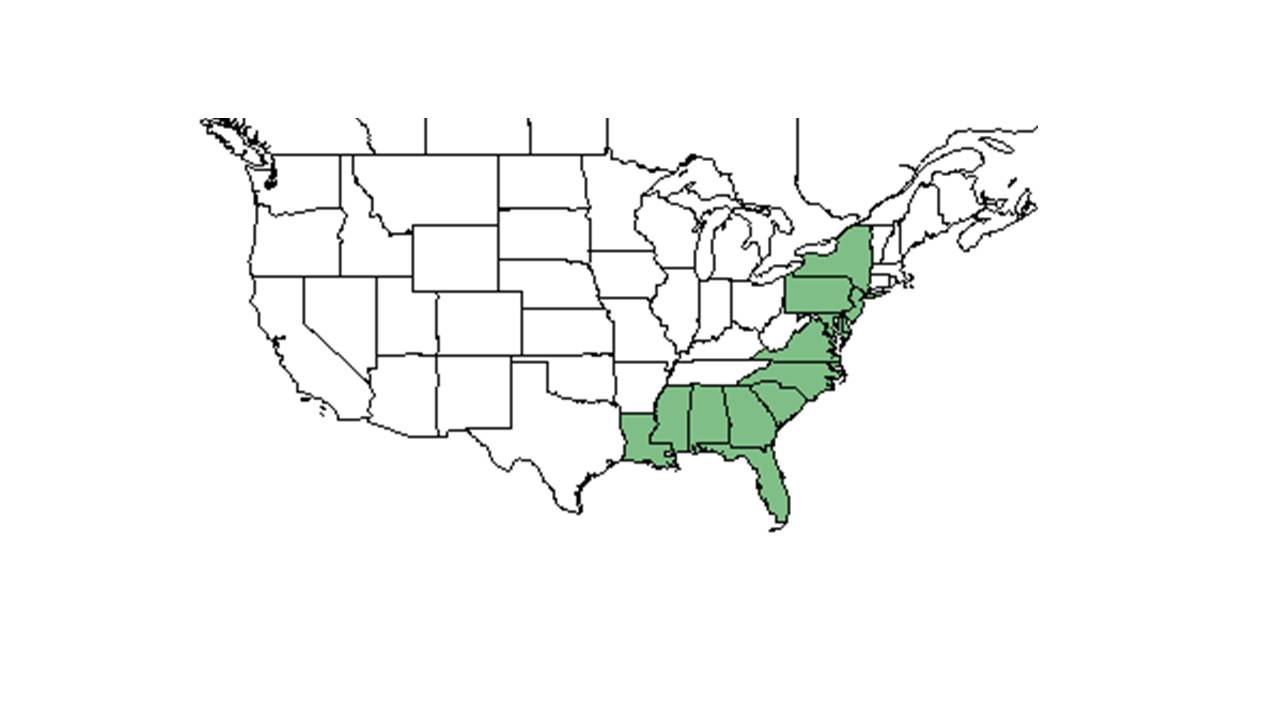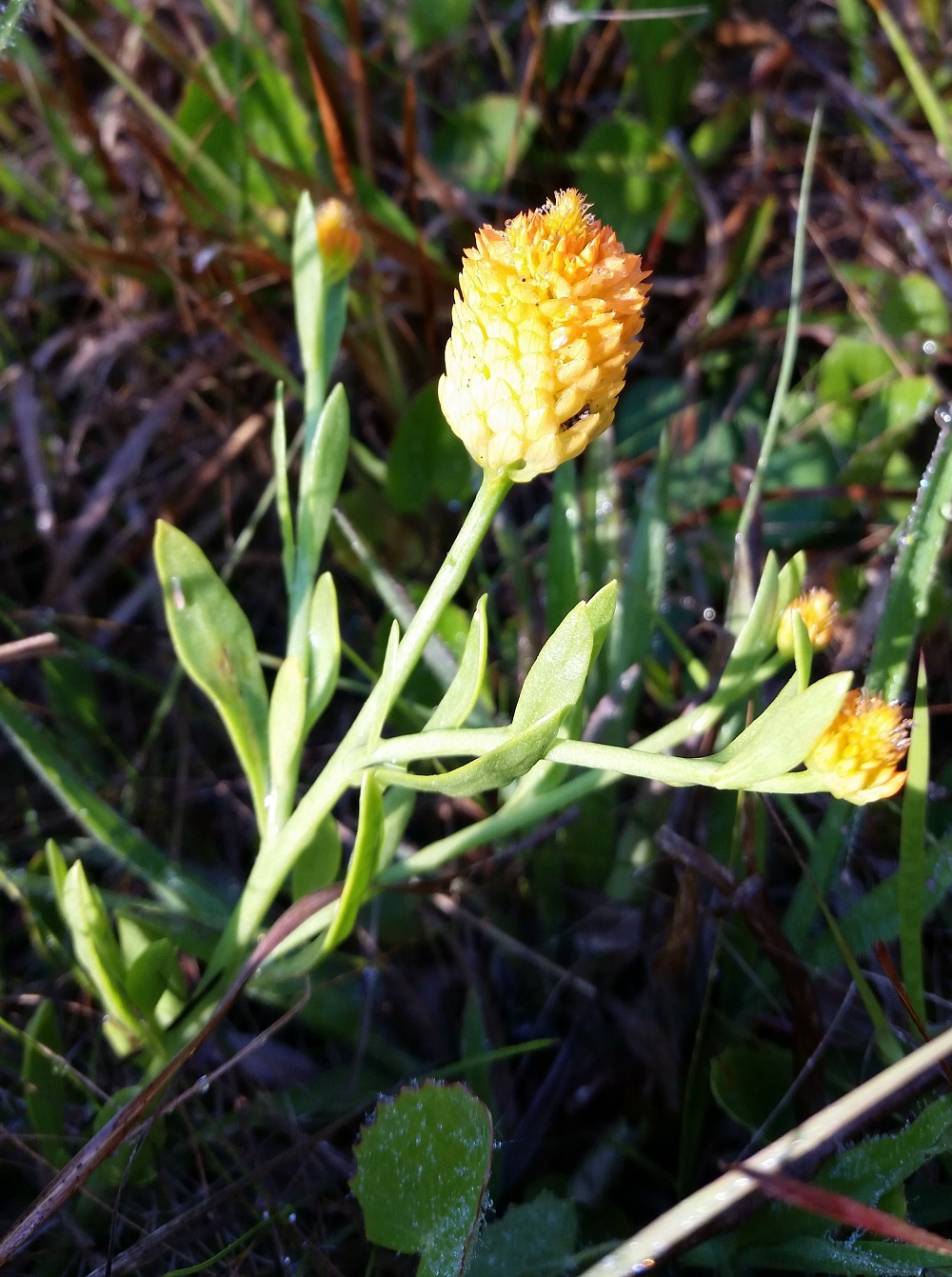Polygala lutea
| Polygala lutea | |
|---|---|
Error creating thumbnail: Unable to save thumbnail to destination
| |
| Photo taken by Gil Nelson | |
| Scientific classification | |
| Kingdom: | Plantae |
| Division: | Magnoliophyta – Flowering plants |
| Class: | Magnoliopsida – Dicotyledons |
| Order: | Polygalales |
| Family: | Polygalaceae |
| Genus: | Polygala |
| Species: | P. lutea |
| Binomial name | |
| Polygala lutea L. | |

| |
| Natural range of Polygala lutea from USDA NRCS Plants Database. | |
Common name: orange milkwort
Contents
Taxonomic notes
Synonyms: Pilostaxis lutea (Linnaeus) Small; Pylostachya lutea (Linnaeus) Small
Description
"Herbs, whorled or alternate rarely opposite, entire leaves. Flowers lavender, pink, white or yellow, in racemes or spikes, terminating the branches or in terminal corymbs. Flowers perfect, zygomorphic, with 3 small sepals, frequently one of these slightly larger than the others, and 2 larger petaloid sepals (wigs). The 3 petals are united into a tube, 3-lobed at apex, the 2 lateral lobes usually the longer, the center lobe usually lacerate, often thicker in texture; stamens 6-8, united to the corolla tube in 2 rows. Capsule 2 –locular, with one seed in each locule. Seeds dark brown or black, ellipsoid or ovoid, rarely globose, 0.5-3 mm long, usually densely pubescent. The genus has been divided into several genera none of which have distinct characteristics. Orange flowers turn pale yellow on drying, yellow ones bluish green; the pink or lavender ones remain the same color or fade slightly." - Radford et al 1964
"Glabrous biennial or short-lived perennial with succulent leaves in basal rosettes, stems 1.5-5 dm tall. Leaves oblanceolate to spatulate, stems leaves to 4 cm long, 1 cm wide, reduced upward, the basal leaves often larger. Flowers in compact head-like racemes 1-3.5 cm long, 1.2-2 cm broad, brilliant orange. Sepals 1.2-1.5 mm long, acute, wings elliptic, 5.5-6.5 mm long, acuminate; corolla nearly as long as the wings, fringed; stamens 6. Seeds black, 1-1.3 mm long, densely pubescent; aril 2-lobed, lobes ca. ½ as long as the seed body." - Radford et al 1964
Distribution
P. lutea is known to occur in open wet pine savannas (Hinman and Brewer 2007). Observed species in sandhill longleaf pine habitat that has 1 to 3 year fire return intervals, on Pebble Hill Plantation (Michelle M. Smith – early summer 2014 and 2015).
Ecology
Habitat
This species has been found in pine flatwoods, boggy areas, and swamp edges (FSU Herbarium). It has been found in open lit areas in drying, loamy sands as well as wet soils (FSU Herbarium). This species has also been found growing in human disturbed areas such as along roadsides as well (FSU Herbarium). Associated species include longleaf pine, cypress, and wiregrass (FSU Herbarium).
Phenology
It has been observed flowering in April, May, July, and September (FSU Herbarium).
Fire ecology
This species is found in annually burned pinelands (FSU Herbarium).
Conservation and Management
Cultivation and restoration
Photo Gallery
References and notes
Florida State University Robert K. Godfrey Herbarium database. URL: http://herbarium.bio.fsu.edu. Last accessed: June 2014. Collectors: Loran C. Anderson, Rodie White, R. A. Norris, Robert K. Godfrey, R. Komarek, M. Davis, Cecil R Slaughter, Marc Minno, and Bob Fewster. States and Counties: Florida: Duval, Flagler, Franklin, Osceola, and Wakulla. Georgia: Grady and Thomas.
Hinman, S. E. and J. S. Brewer (2007). "Responses of two frequently-burned wet pine savannas to an extended period without fire." Journal of the Torrey Botanical Society 134: 512-526.
Radford, Albert E., Harry E. Ahles, and C. Ritchie Bell. Manual of the Vascular Flora of the Carolinas. 1964, 1968. The University of North Carolina Press. 658. Print.
